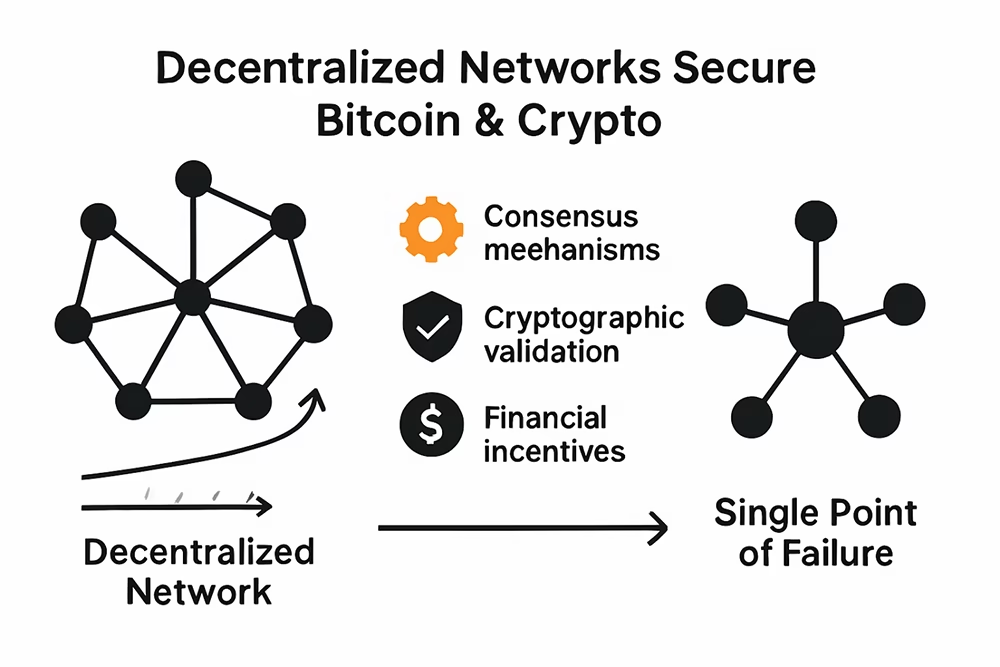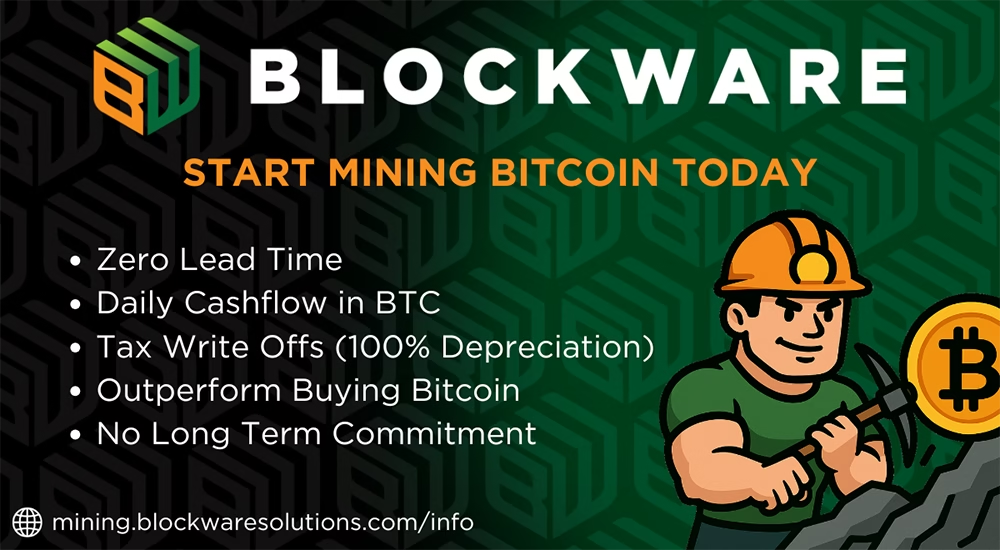
Decentralization is shaking up the crypto world, making headlines for reshaping how money and power flow online. Most people expect that the real progress is just about owning some coins or mining a few blocks. But take a closer look. Over 61 public companies have already adopted Bitcoin for their treasuries and some, like Strategy, saw their stock soar by more than 3,000 percent since 2020. This kind of shift is not just about technology or trading—it is unlocking financial freedom and security in ways that banks and governments never could. What happens when anyone with a smartphone can join the global economy, no permission required?
|
Takeaway |
Explanation |
|
Decentralization enhances security of crypto networks. |
Distributing control across multiple nodes prevents single points of failure and makes manipulation difficult. |
|
Cryptocurrencies empower unbanked populations. |
Direct peer-to-peer transactions eliminate barriers faced by individuals without access to traditional banking. |
|
Diverse mining hardware promotes network integrity. |
Devices like Antminer and Whatsminer allow broader participation, preventing centralization of mining operations. |
|
Companies are adopting Bitcoin treasury strategies. |
Organizations are integrating cryptocurrency into assets to hedge against inflation and volatility. |
|
Decentralization transforms financial autonomy. |
Eliminating intermediaries in financial transactions provides individuals with unprecedented control over their resources. |

Decentralization represents the core architectural strength that protects Bitcoin and cryptocurrency networks from systemic vulnerabilities. By distributing control and processing power across thousands of independent nodes, blockchain technology creates an unprecedented security model that eliminates traditional centralized weaknesses.
In a decentralized system, no single point of failure exists. Research from MIT demonstrates that distributed networks inherently resist manipulation and attack attempts. Unlike centralized financial systems where a single server breach can compromise entire networks, Bitcoin’s decentralized architecture means an attacker would need to simultaneously control multiple geographically dispersed nodes to compromise the system.
The blockchain’s consensus mechanism further enhances security. Nodes must validate transactions through complex mathematical proofs, making malicious interventions exponentially difficult. Each transaction requires verification from multiple independent sources, creating a robust authentication process that traditional banking systems cannot match.
Academic research from ACM reveals that decentralization provides cryptographic security beyond conventional protection methods. The distributed network ensures that no single entity can manipulate transaction records or blockchain history. Every transaction is permanently recorded across thousands of nodes, creating an immutable and transparent ledger.
This approach means potential attackers would need extraordinary computational power to alter blockchain records. The energy and resources required to compromise a decentralized network make such attacks economically unfeasible. Miners and nodes worldwide continuously validate and protect the network, creating a self-regulating security ecosystem that adapts and resists potential threats.
Economic Incentives Reinforcing Network Security
Decentralization creates powerful economic incentives that naturally protect cryptocurrency networks. Miners who validate transactions are economically motivated to maintain network integrity. Any attempt to manipulate the system would result in immediate financial penalties, discouraging malicious activities.
The proof-of-work mechanism ensures that computational power is distributed, preventing centralized control. Participants must invest significant resources to validate transactions, which creates a natural barrier against potential network attacks. This economic model transforms security from a technical challenge into a self-sustaining ecosystem where participants are financially rewarded for maintaining network reliability.
By eliminating centralized control, Bitcoin and cryptocurrencies have developed a revolutionary approach to digital security. Decentralization isn’t just a technical feature it’s a fundamental transformation of how we conceptualize trust, transparency, and protection in digital financial systems.
|
Security Feature |
Decentralization Benefit |
|
No Single Point of Failure |
Network resists attacks since control is distributed across nodes |
|
Consensus Mechanism |
Multiple nodes verify transactions, preventing manipulation |
|
Immutable Ledger |
Transactions recorded across thousands of nodes, creating permanence |
|
Economic Incentives |
Miners are rewarded for validating, not attacking, the network |
|
Proof-of-Work Distribution |
Requires significant resources to attack, deterring malicious actors |
|
Self-Regulating Ecosystem |
Miners and nodes adapt to threats and maintain system integrity |
Decentralized financial systems represent a transformative approach to personal economic empowerment, offering individuals unprecedented control over their financial resources without traditional institutional barriers. By eliminating intermediaries and providing direct peer-to-peer transactions, cryptocurrencies are redefining the concept of financial autonomy.
Breaking Barriers for Unbanked Populations
Research from Time Magazine highlights how decentralized systems provide critical financial access in regions with unstable economic environments. In countries experiencing hyperinflation or restrictive banking policies, cryptocurrencies offer a lifeline for individuals seeking to preserve their economic value and conduct transactions independently.
Traditional banking systems often exclude millions of people worldwide due to high entry barriers, complex documentation requirements, and geographical limitations. Decentralized financial platforms democratize access by requiring only an internet connection and a digital wallet. This approach enables individuals in underserved communities to participate in global economic networks without relying on traditional financial infrastructure.
Comprehensive analysis from global financial experts reveals that blockchain technology introduces a revolutionary model of financial sovereignty. By removing centralized control, individuals can transfer value across borders instantly, without expensive intermediary fees or bureaucratic restrictions.
Consider the groundbreaking example of El Salvador, the first country to adopt Bitcoin as legal tender. This bold move demonstrates how decentralized systems can provide alternative financial mechanisms for entire populations. The government’s initiative of distributing Bitcoin to citizens illustrates the potential for cryptocurrencies to offer direct economic empowerment.
Decentralized financial systems provide robust protection against economic volatility and governmental monetary manipulation. When traditional currencies experience rapid devaluation, cryptocurrencies offer a potential store of value that operates independently of central bank policies.
The peer-to-peer nature of these systems means transactions occur directly between participants, reducing systemic risks associated with centralized financial networks. This approach creates a more transparent, accessible, and potentially more equitable financial ecosystem where individuals have greater control over their economic resources.
As global economic landscapes continue to evolve, decentralized financial systems represent more than just a technological innovation. They embody a profound shift towards individual economic empowerment, offering people worldwide new opportunities to manage, protect, and grow their financial resources beyond traditional constraints.
Decentralized mining represents a critical mechanism for maintaining Bitcoin’s network integrity, with specialized hardware like Antminer and Whatsminer playing a pivotal role in distributing computational power across global networks. This approach ensures no single entity can monopolize mining operations, preserving the fundamental principles of blockchain technology.
|
Mining Hardware |
Decentralization Benefit |
Participation Level |
Security Enhancement |
|
Antminer |
Enables global individual participation in mining |
High |
Increases distribution |
|
Whatsminer |
Breaks barriers for small-scale operators |
High |
Reduces centralization |
Research from the National Bureau of Economic Research highlights how diverse mining hardware contributes to network resilience. Antminer and Whatsminer devices enable individual miners worldwide to participate in blockchain validation, breaking down barriers to entry that traditionally existed in cryptocurrency mining.
The proliferation of accessible mining hardware democratizes the mining process. Unlike early Bitcoin mining days dominated by specialized data centers, modern devices allow enthusiasts and small-scale operators to contribute meaningful computational power. This diversity prevents centralization and reduces the risk of potential network manipulation.
Mining hardware like Antminer and Whatsminer transforms cryptocurrency mining from an exclusive enterprise to a more inclusive economic activity. By lowering technical and financial barriers, these devices enable global participation in blockchain networks. Learn more about mining technologies and how they’re reshaping digital economies.
Each mining device represents a node in the distributed network, contributing to transaction verification and network security. The economic incentives built into mining encourage widespread participation, ensuring no single entity can control the entire mining ecosystem. This model creates a self-regulating mechanism where individual miners’ interests align with network stability.
The distributed nature of mining hardware provides inherent protection against potential attacks. An attacker would need to simultaneously compromise thousands of geographically dispersed mining devices to manipulate the blockchain, making such attempts economically and technically unfeasible.
Antminer and Whatsminer devices continuously evolve, introducing more energy-efficient and powerful mining capabilities. This technological progression ensures that the mining ecosystem remains dynamic, adaptable, and resistant to centralized control. Each new generation of mining hardware further decentralizes computational power, enhancing the overall security and reliability of cryptocurrency networks.
As cryptocurrency ecosystems continue to mature, the role of decentralized mining hardware becomes increasingly crucial. Antminer and Whatsminer represent more than technological tools they are fundamental components of a global, democratic financial infrastructure that empowers individuals and protects against systemic vulnerabilities.
Decentralization is fundamentally transforming stock market dynamics and corporate treasury management, introducing unprecedented strategies for asset diversification and financial risk mitigation. As traditional financial paradigms evolve, companies are increasingly exploring cryptocurrency as a strategic asset class with unique economic characteristics.
Corporate Treasury Transformation
Research from Reuters reveals a groundbreaking trend: 61 non-crypto public companies have adopted Bitcoin treasury strategies, allocating portions of their cash reserves to cryptocurrency. This approach mirrors the success of Strategy (formerly MicroStrategy), whose early Bitcoin investments generated stock appreciation exceeding 3,000% since 2020.
Corporate leaders recognize cryptocurrency’s potential as a hedge against inflation and economic volatility. By diversifying treasury holdings, companies can protect their financial reserves from traditional currency devaluation and potentially generate significant returns. Explore advanced treasury management techniques to understand this emerging financial strategy.
International Monetary Fund research highlights the potential of distributed ledger technology to reduce intermediary costs and enhance payment efficiency. Notably, emerging discussions suggest potential government interventions, such as the proposed U.S. Bitcoin strategic reserve, which could fundamentally reshape national economic strategies.
The proposed Bitcoin strategic reserve represents a potentially transformative approach to national financial management. By treating cryptocurrency as a strategic asset similar to gold or petroleum reserves, governments could establish new mechanisms for economic stabilization and geopolitical leverage.
While cryptocurrency integration offers significant opportunities, corporate and national decision makers must carefully navigate inherent risks. Analysts caution about potential volatility, with some warning about potential losses if Bitcoin’s price declines below critical thresholds.
The emerging landscape of crypto treasury management requires sophisticated risk assessment strategies. Companies must balance potential high returns against market unpredictability, developing robust frameworks that integrate cryptocurrency without compromising overall financial stability.
As decentralized financial technologies continue to mature, their impact on stock markets and treasury management will likely become increasingly sophisticated. Forward-thinking organizations are positioning themselves to leverage these innovations, recognizing that cryptocurrency represents more than a speculative asset it’s a fundamental shift in how we conceptualize financial value and economic infrastructure.

Decentralization enhances security, empowers unbanked populations, promotes economic resilience, and provides financial autonomy by eliminating intermediaries in transactions.
Decentralization secures crypto networks by distributing control across independent nodes, eliminating single points of failure, and implementing economic incentives that discourage manipulation.
Mining hardware such as Antminer and Whatsminer promotes decentralization by enabling a diverse and inclusive mining ecosystem, allowing individual participation and preventing centralization of mining operations.
Many public companies are adopting Bitcoin treasury strategies as a hedge against inflation, integrating cryptocurrency into their asset management to diversify holdings and protect against currency devaluation.
Are you ready to experience true financial independence and enhanced network security? The article highlights how decentralization in Bitcoin and crypto gives you freedom from single points of failure and opens the door for anyone to join the global economy. Still, many people find it hard to participate in mining or take advantage of these benefits because the setup process is daunting and risks are high without guidance. Now you can move beyond those limitations with Blockware Solutions.

Let us help you transform curiosity into action. At Blockware Solutions, you can start mining Bitcoin instantly with our hosted Mining-as-a-Service model. Gain direct access to Antminer and Whatsminer hardware, cutting-edge research, and real-time ROI tools. Make your first step toward financial sovereignty and network resilience by visiting our Bitcoin Mining Made Easy platform. Don’t wait while others gain the advantage. Act now to join a decentralized future and take full control of your assets.